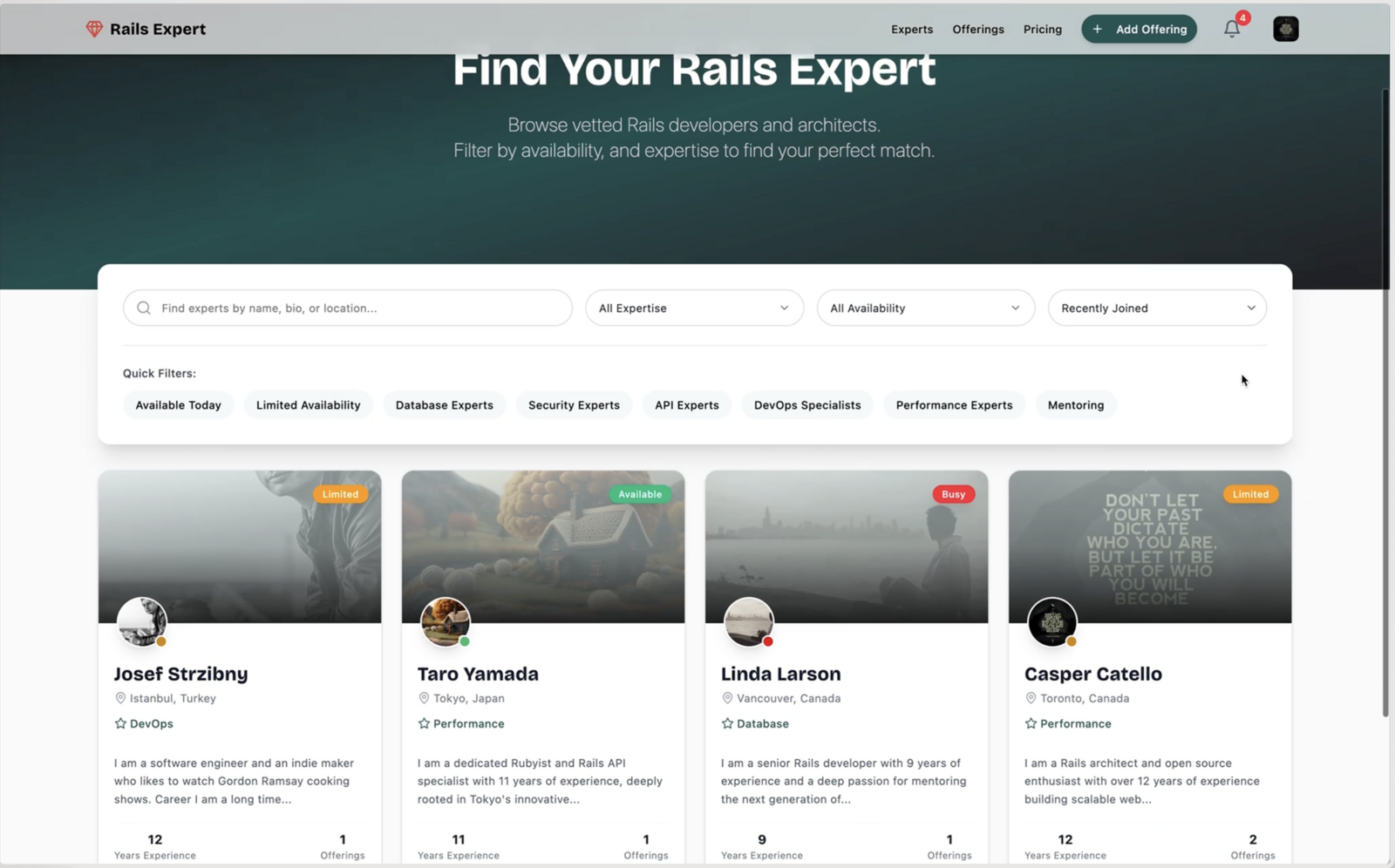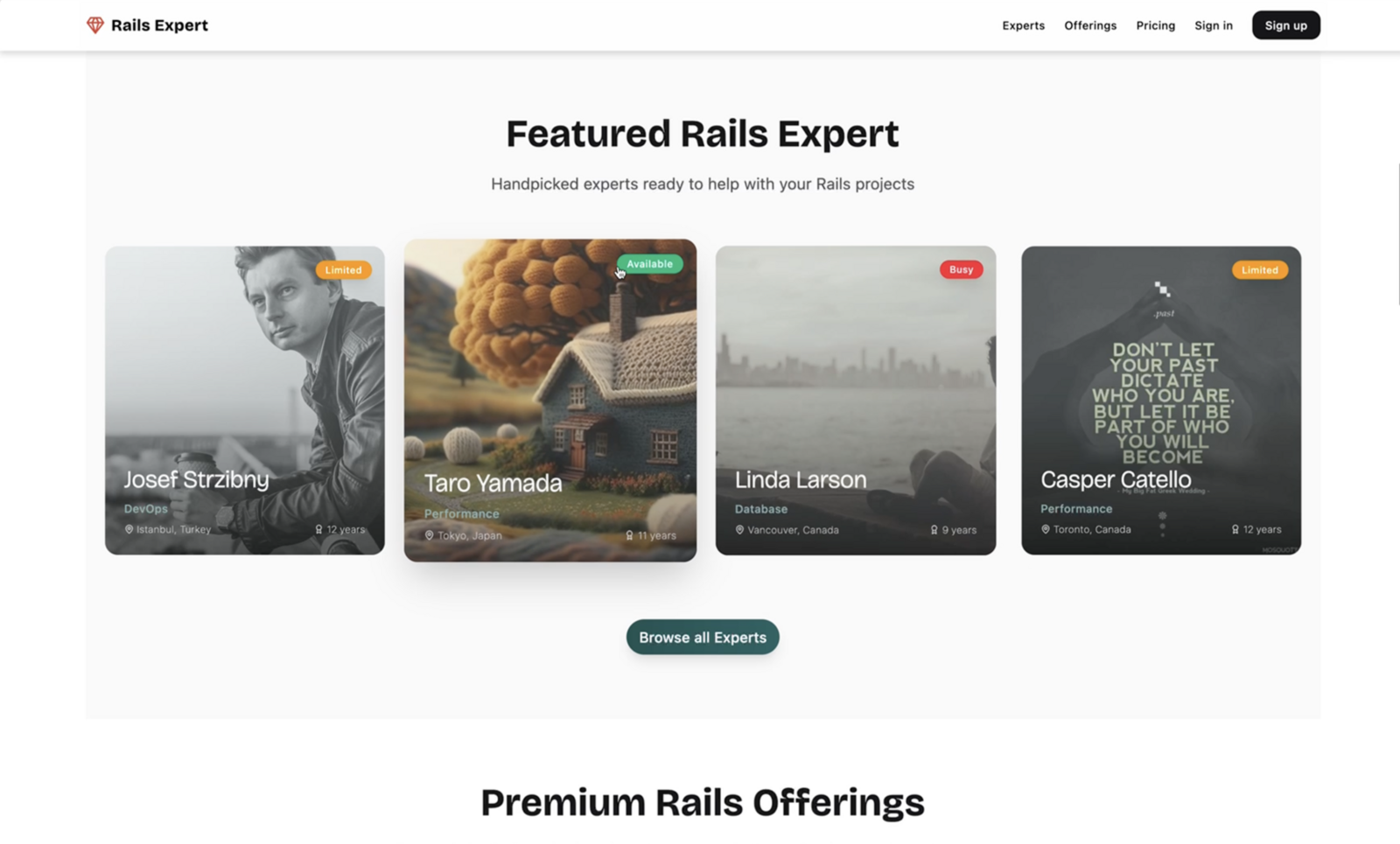Recently it's become obvious to many clients and businesses—specialized talent platforms are eating LinkedIn's and other generic talent platforms' lunch. And that's fantastic news for Rails developers.
Let me tell you about the most expensive mistake in hiring history. Grab a coffee.
No, not Yahoo rejecting Microsoft's $44 billion offer. Not Blockbuster passing on Netflix. I'm talking about every company, every day, using general expert marketplaces to find specialized talent. It's like using a metal detector to find a specific grain of sand on a beach. Sure, it beeps a lot. But mostly at bottle caps and old coins.
McKinsey published something that should make every CEO spit out their morning coffee—high performers in specialized roles are 800% more productive than average performers.
Let that sink in for a moment.
That's not a typo. That's not a rounding error. That's the difference between a rowboat and a yacht. Between a calculator and a quantum computer. Between someone who thinks Ruby is a gemstone and someone who dreams in ActiveRecord migrations.
That's not a typo. That's not a rounding error. That's the difference between a rowboat and a yacht. Between a calculator and a quantum computer. Between someone who thinks Ruby is a gemstone and someone who dreams in ActiveRecord migrations.
Eight. Hundred. Percent.
While the rest of us were playing résumé roulette on LinkedIn, the medical industry quietly revolutionized hiring. Take Doximity. They built a platform exclusively for healthcare professionals. No marketers. No "growth hackers." No crypto enthusiasts. Instead, laser focus on doctors, nurses, and medical professionals.
Ready for the results? Hold onto your stethoscope:
- Over 2 million verified medical professionals on the platform
- Response rates of 24% versus the industry's pathetic 2-4%
- Cost per hire? Four times lower than traditional methods
That's like the difference between sending a telegram and having a conversation. Between throwing a message in a bottle and actually delivering mail.
Healthcare organizations aren't posting jobs and praying anymore. They're finding exactly who they need, when they need them, because they're fishing where the fish actually are.
Revolutionary concept, I know!
You might have heard of the 3% club? No?! Meet Toptal. They did something everyone said was commercial suicide, they reject 97% of applicants
Ninety. Seven. Percent.
That's pickier than a five-star restaurant critic at a gas station hot dog stand. Their acceptance rate is lower than Harvard's. Lower than Navy SEALs training. Lower than the chance of your PR being merged on your first try.
That's pickier than a five-star restaurant critic at a gas station hot dog stand. Their acceptance rate is lower than Harvard's. Lower than Navy SEALs training. Lower than the chance of your PR being merged on your first try.
But here's the kicker—that 3% who make it through? They have a 98% trial-to-hire success rate. Companies happily pay $60-150+ per hour for Toptal talent. Meanwhile, on Upwork, Fiverr and the like, people are bidding $15 an hour and wondering why their app looks like it was built in 1997.
It's not about being elitist. It's about being effective.
Think of it this way—when you need brain surgery, you don't go bargain hunting. When you need Rails expertise, why would you settle for someone who thinks migrations involve birds flying south?
While specialized platforms thrive, general talent platforms are turning into digital haunted houses. Greenhouse shared a shocking truth, about 20% of job postings are "ghost jobs", positions that don't actually exist. They're posted to collect résumés, make companies look like they're growing, or because someone forgot to take them down.
One in five.
That's like going to a restaurant where 20% of the menu items aren't actually available. "Oh, you wanted the Rails Developer Special? Sorry, that's just for show."
Even worse? Software developer listings on Indeed have dropped 35% since their 2020 peak, according to The Pragmatic Engineer's analysis of Indeed's own data. This isn't a recession. This is a reckoning.
The general platforms are becoming where good opportunities go to die, and where desperate developers go to lose hope. This is sad!
Remember when "starving artist" was redundant? 99designs changed that narrative. They didn't promise designers they'd get rich quick. They promised something better—a platform where design actually matters.
Eduardo Lessa, a Brazilian designer using the handle 'artsigma', won 587 design contests and completed over 350 projects. The platform didn't just pay his bills—it bought him a house. An actual house. With walls. And a roof. Not a "maybe someday" house. A "here are the keys" house.
Dribbble and Behance followed the same playbook. They don't compete on price. They compete on curation. On community. On actually giving a damn about design.
The result? Designers stopped racing to the bottom and started racing to the top.
Why shouldn't Rails developers have a place like that?
Even lawyers figured it out. (And when lawyers are ahead of you in technology adoption, you know you're in trouble.) Axiom Law serves 75% of the Fortune 100 by providing specialized legal talent for specific projects. They don't compete with $50/hour document reviewers on general platforms. They provide $500/hour expertise when companies actually need it.
Even lawyers figured it out. (And when lawyers are ahead of you in technology adoption, you know you're in trouble.) Axiom Law serves 75% of the Fortune 100 by providing specialized legal talent for specific projects. They don't compete with $50/hour document reviewers on general platforms. They provide $500/hour expertise when companies actually need it.
Premium pricing. Premium results. Everybody wins except the middlemen.
Here's some shocking news—the online recruitment market is exploding toward $58.94 billion by 2033. But here's what the report buries in the fine print: the growth isn't in general platforms. It's in "niche and industry-specific hiring solutions."
Translation: Specialized platforms are eating everyone's lunch, dinner, and tomorrow's breakfast.
Let's recap, shall we? Look at the evidence:
- Healthcare has Doximity
- Developers have Toptal
- Designers have 99designs, Dribbble, Behance
- Lawyers have Axiom
- And Rails developers? Well, we'll get to that.
You might ask why this matters. Remember that McKinsey stat about 800% productivity?
That's not because specialized workers are superhuman. It's because they don't waste time on:
That's not because specialized workers are superhuman. It's because they don't waste time on:
- Learning on the job what they claimed to know
- Googling basic concepts during meetings
- Using AI tools to fake their way through
- Building half-assed solutions that already exist as gems
- Arguing about conventions that were settled in 2004
When you hire through specialized platforms, you're getting someone who knows why DHH's opinions matter (even when they disagree). Someone who understands Rails conventions exist (and when to break them). Someone with actual Rails battle scars.
But traditional platforms make finding these people nearly impossible.
Post a Rails job on LinkedIn? You'll get 500+ applications. Maybe one is actually qualified. That's a 0.2% success rate.
Last year Adam Wathan spent 133 hours reviewing 1,600 applicants. Hired zero.
"The best hires that we've made have been people who we've either known about their work or, someone that we know and trust has vouched for them," Adam admitted.
That's exactly why Rails Expert exists.
We flipped the model. No job postings. No "urgent Rails ninja needed!" listings.
Instead, a curated showcase of verified Rails experts.
Every developer gets personally vetted by humans who understand Rails. We check your GitHub, your gems, your experience. We ask around. No approval? You're invisible.
Once verified, you showcase your expertise and offerings. Clients browse pre-vetted talent and connect directly with experts who match their needs.
No 1,600 applications to skim. Just 20 verified experts whose work speaks for itself.
Here's the bottom line (written in Ruby, obviously)
class FutureOfHiring
def initialize
@general_platforms = :dying
@specialized_platforms = :thriving
@rails_expert = :inevitable
end
def hire_rails_developer
return :suffering if platform == "LinkedIn"
return :frustration if platform == "Indeed"
return :success if platform == "Rails Expert"
end
endThe age of "spray and pray" job posting is over. The era of "post and ghost" is dying. The general platforms are becoming digital junkyards where good opportunities go to die.
The specialists have won. And they won by doing something revolutionary, giving a damn about their specific community.
Medical professionals have their platform. Designers have theirs. Top developers have theirs.
Rails developers deserve the same.
Because when McKinsey says specialized talent is 800% more productive, they're not talking about people who "know a little Rails." They're talking about people who breathe it. Who contribute to it. Who lose sleep over it. Who argue about it on Twitter at midnight.
They're talking about the kind of developers you find when you stop casting wide nets and start fishing where the fish actually are.
Welcome to Rails Expert. We've been expecting you.
- Ahmed

